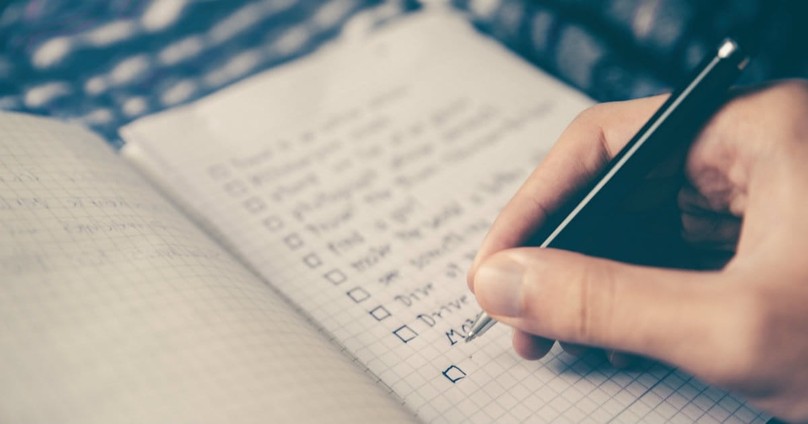
I’m the type of woman whose eyes light up at new, impossible-sounding ideas. I’m the first one to jump into a new idea: I love making connections, seeing possibilities, and dreaming about the future. But then the laundry pile stares me in the face. So I leave the brainstorming about ideas, and put in the laundry in the wash, only then to realize I’d forgotten my keys and books on the top of the washer when I was interrupted coming home from picking up my child from preschool. By then my children need a snack, I need to return the keys to their drawer, and I’d forgotten what I was doing. Sound familiar?
It’s easy for us to get distracted from the necessary by the urgent. And when we’re distracted by all that needs doing and all we want to do and be, we easily succumb to overwhelm.
Rather than overhauling our lives, habits, and priorities (which can feed into overwhelm!), here are 10 things that might help you combat overwhelm today:

1. Breathe.
Often we’re running on fumes and we realize we’re not even pausing long enough to breathe. When we take a few deep breaths – in through your nose and out through your mouth – we actually lower our stress levels in the body. So when you feel like you’re spinning, start by taking 5 slow, deep breaths.
Photo Courtesy: ©Thinkstock

2. Realize you’re but dust.
Overwhelm stems from a larger problem – we think we can do more than we are able to do. After breathing, turn to those passages in Scripture that remind you that to be human is to be limited (James 4:14, Psalm 144:4). Thank God that your limitations means he can show his power in your weakness. Meditate on what it means to be the creature, not the creator: you are not all-powerful, and for that we praise God.
Photo Courtesy: ©Thinkstock

3. Drink water.
We like to have fancy things to do when we’re struck with strong emotions like overwhelm, but often simply grounding practices – like drinking a glass of water – helps bring us back to reality. When we’re dehydrated, it actually causes more stress! Plan to drink a 10-ounce glass of water at meals, upon waking, and going to bed to stay hydrated.
Photo Courtesy: ©Thinkstock/miya227

4. Ground yourself in the Word.
We feel overwhelm when our identities and tasks aren’t grounded in the larger story of the Bible – of who God says we are, what our work is about, and how to interact with others in our lives. Even if it’s just a few verses a day (along with your breathing and water), read your Bible and ask God to show you how your story fits in line with his good news.
Photo Courtesy: ©Thinkstock

5. Ground yourself on the ground.
Overwhelm accrues when we’re so much in our heads that our action is stymied. Take a walk, or use your feet to do something active – whether that’s walking, running, or dancing in your kitchen. We are whole people and our bodies can help reorient our minds and spirits.
Photo Courtesy: ©Thinkstock

6. Get outside.
In the digital age, we’re cooped up inside much more than previous generations. Even just 15 minutes a day outside can boost mental clarity, increase focus, and reduce anxiety. Walking our children to school each day has allowed us not only to reduce the stress of the morning rush out the door, but also provided us with time to connect as a family, think through things together, and laugh. Try it.
Photo Courtesy: ©Thinkstock

7. Get outside of your own head.
When you do something for another person – even small acts of generosity – we reduce stress and even increase our longevity! When we take our eyes off of ourselves to see someone else, we practice empathy and compassion. This “freedom of self-forgetfulness” (Tim Keller) is actually where the good life is found – not in To Do’s crossed off, productivity gained, or financial rewards reaped. Start small – bake cookies for your family and someone in your neighborhood. Then keep looking for ways to serve others in larger capacities.
Photo Courtesy: ©Thinkstock

8. Brain dump.
Find a system where you can dump all the swirling thoughts in your brain on a piece of paper. List-writing might work for you. Or, if you’re a verbal processor, consider recording a voice memo on your phone and then writing it down later so you have something to refer back to. When we have a place to put down the information and then a plan for how to accomplish what needs doing, we reduce overwhelm.
Photo Courtesy: ©Thinkstock

9. Turn off technology.
When our brains are already on overdrive, turning to technology to quell the inner restlessness will never work. Plan times in your day to use social media, but don’t turn to social media, or endless article reading, to distract you from the people around you and what needs doing. Always prioritize in-person community above virtual community.
Photo Courtesy: ©Thinkstock

10. Involve others
We can never battle overwhelm, anxiety, or depression alone. Sometimes we might need medical help. Other times we need a friend to check in on us regularly in person or over the phone. We need a community who will pray for us, guide us, provide for us, and help us to get outside of ourselves. As we invest in healthy Christian community, we’ll see how God always uses others to encourage, challenge, teach, admonish, and love us.
No magic formula will help you fully combat those feelings of overwhelm, fatigue, and listlessness that will inevitably come. Thank God we have a Father in heaven who sees us and looks tenderly on us. May we run to him.
----
Ashley Hales is a writer, speaker, church planter’s wife, and mom to 4 littles in southern California. Ashley has written for places such as The Gospel Coalition, Books & Culture, and ThinkChristian and is writing her first book, Finding Holy in the Suburbs (IVP). Be sure to connect with her at her blog, Facebook, or Twitter. Subscribe to get a free booklet on how to practice sustained attention and chase beauty right where you are.
Photo Courtesy: ©Thinkstock
Originally published Monday, 29 January 2018.



